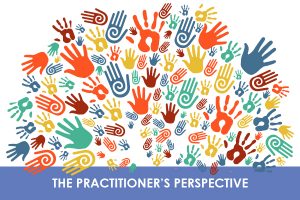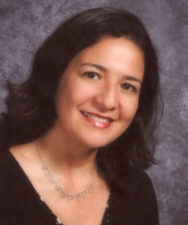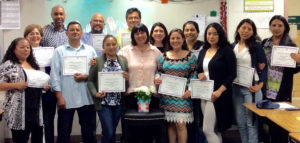Exploring Equity Issues - Blog

Engaging Immigrant and English Learner Families
By Monica Lozano Caldera
Minority Achievement Coordinator, Gunston Middle School, Arlington, VA
June 2017
Monica Lozano Caldera is passionate about social justice. She has been helping diverse families for over 15 years, eventually focusing her energy in a public school district. It was her passion that made MAEC excited to partner with IDRA’s EAC-South to work with her school as we piloted ¡Adelante! Moving Forward! Through her work with families and the community, Ms. Lozano Caldera has developed a deep understanding of the complexities of the immigrant and bicultural experience including race and cultural identity.
In 2015, MAEC partnered with the Lawyers’ Committee for Civil Rights Under Law to develop a guide for those individuals working to educate immigrant parents on how to advocate for their children. Out of that effort, Adelante! was born. We designed it as a toolkit for those working with parents of English Learners to develop a cadre of parent leaders.
Ms. Lozano Caldera is a Licensed School Counselor with a Master’s Degree from Catholic University, Valencia (Spain) in Family Counseling. She joined Arlington Public Schools (VA) nine years ago as an ESOL/HILT Resource Counselor. She currently holds a position as Minority Achievement Coordinator in Gunston Middle School. Ms. Lozano Caldera is bilingual (Spanish and English).
MAEC sat down with Ms. Lozano Caldera so she could share her experience.
Can you describe your school district?
 Ms. Lozano Caldera (MLC): Arlington Public Schools (APS) serves the citizens of Arlington County, Virginia. APS is an urban school system that educates a very diverse student population– students come from 127 countries and speak 105 languages. APS operates more than 30 schools and programs. Our Schools and Programs include 23 Elementary Schools, 5 Middle Schools, 4 High Schools, 1 Secondary (grades 6-12) and 4 Other Programs. Our student demographic consists of White (46.9%), Hispanic (27.9%), Black/African American (10.3%), Asian (9.0%), American Indian/Alaskan Native (0.4%), Native Hawaiian/Pacific Islander (0.1%), Multiple (5.4%) and Students with Subsidized Meals (31.4%).
Ms. Lozano Caldera (MLC): Arlington Public Schools (APS) serves the citizens of Arlington County, Virginia. APS is an urban school system that educates a very diverse student population– students come from 127 countries and speak 105 languages. APS operates more than 30 schools and programs. Our Schools and Programs include 23 Elementary Schools, 5 Middle Schools, 4 High Schools, 1 Secondary (grades 6-12) and 4 Other Programs. Our student demographic consists of White (46.9%), Hispanic (27.9%), Black/African American (10.3%), Asian (9.0%), American Indian/Alaskan Native (0.4%), Native Hawaiian/Pacific Islander (0.1%), Multiple (5.4%) and Students with Subsidized Meals (31.4%).
Gunston Middle School and Thomas Jefferson Middle School have high numbers (approximately 22%) of students receiving services from the English for Speakers of Other Languages/High Intensity Language Training (ESOL/HILT) program.
What led up to using Adelante?
MLC: I am aware that family engagement is a powerful predictor of student achievement, and APS offers programs that support family participation. I noticed that while these programs provided a large amount of information regarding how APS as a system works, there were parents who had additional questions about their rights and responsibilities regarding their children’s education. I also noticed the need to build capacity among parents so that they could then use this knowledge and their experiences to empower other families in their communities.
How did it work?
MLC: Under the guidance of the APS Family and Community Engagement (FACE) specialist, the Minority Achievement Coordinator in each school recruited parents of ESOL/HILT students who participated in training the year before. Coordinators partnered with MAEC and IDRA who provided the curriculum, ADELANTE: A Guide to Empower Parents of English Learners to Advocate for their Children, to train our parents to become trainers. Last year the program was open to parents of Gunston Middle School and Thomas Jefferson Middle School with 18 families participating. This year, twelve parents from that group received training to train other parents in the following topics: student rights, parent engagement, interpretation, translation, and special education. These parent-trainers will facilitate training for a group of parents either in their communities or in the schools, and will receive support during the delivery of this program.
What did you learn?
MLC: I learned that the delivery of the training material had to be adjusted to coincide with the parent’s learning style and education level. In addition, at the same time we are presenting the curriculum to parents, I need to provide professional development for teachers and staff on how to communicate and guide parents to better support their child. I would like to create a welcoming climate and culture in the school towards parents so that they are comfortable asking for help, advocating for their children and suggesting new ideas to facilitate partnership between school staff and families.
Can you recommend any best practices or resources for those who want to help in their own schools or districts?
- ¡Adelante! Moving Forward! A Guide to Empower Parents of English Learners to Advocate for their Children. A joint project of the MAEC & the Lawyers’ Committee for Civil Rights Under Law
- Based upon Virginia Collier’s model of language acquisition, the philosophy of the program can be visualized in Collier’s Prism Model (1994)
- “Harvard Family Research Project. A Working Definition of Family Engagement”, Jan. 2014
- Anne Henderson and Karen Mapp. A New Wave of Evidence: The Impact of School, Family, and Community Connections on Student Achievement, 2002.
- Anne Henderson, Karen Mapp, Vivian Johnson and Don Davies. Beyond the Bake Sale: The Essential Guide to Family School Partnerships, 2007.
- Epstein, Joyce et al, School, Family and Community Partnerships: Your Handbook for Action, 2002.
The Center for Education Equity (CEE) at MAEC is inviting members of our advisory board, partners, and other colleagues to share their views on current equity issues. Their opinions do not necessarily reflect CEE’s views or those of the Department of Education and we do not necessarily endorse any products or resources they promote.

